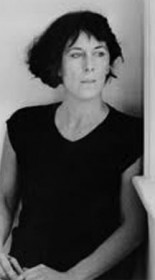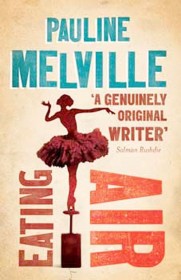About Pauline Melville
Pauline Melville was born in Guyana in 1948. She has worked as an actress, appearing in films such as Mona Lisa and British television programmes including the BBC Television comedy series ‘The Young Ones’.
Her first book, Shape-Shifter (1990), a collection of short stories, won the Common-wealth Writers Prize (Overall Winner, Best First Book) and the Guardian Fiction Prize. The book consists of a number of short stories dealing with post-colonial life in the Carib-bean, notably in her native Guyana, as well as of some stories set in London. Many of her characters, most of them displaced people from former colonies struggling to come to terms with a new life in Britain, attempt to find an identity, to reconcile their past and to escape from the restlessness hinted at in the title.
Her first novel, The Ventriloquist’s Tale (1997), won the Whitbread First Novel Award and was shortlisted for the Orange Prize for Fiction. In it she explores the nature of fiction and storytelling and writes about the impact of European colonisers on Guyanese Amerindians through the story of a brother and sister.
Eating Air
Most of the reviews of Pauline Melville’s EATING AIR so far have remarked on the many characters introduced in the novel:
Eating Air has a wide-cast of characters and the story moves seamlessly from one to another . . . Despite the wide cast of characters I found it easy to remember who was who (not always the case in my experience!) – Technically, the novel is a virtuoso performance, playing with a gallimaufry of characters… — Independent.
…for 407 pages we’re jumping from character to character, scene to scene, at a pace that is exhilarating (if slightly dizzying). Melville has created the literary equivalent of a Cirque de Soleil performance.
The number of characters (one person counted over 18; I didn’t bother to count) may prompt this question: Does the novelist have to introduce several characters to give us a wide story? Marlon James’s Book of Night Women covers roughly two plantations of people, and we meet several of them. But, arguably, the many minor characters we meet never take our attention away from the novel’s few major characters. They either help the plot along, or give us something additional to think of the major characters.

Pauline Melville’s Eating Air, on the other hand, gives us a kaleidoscope of characters and plots, and though the characters and plots intertwine—which helps keep them all in one place, so to speak—what we get is essentially an artistic realism where plots are sometimes planned, sometimes incidental, and the outcomes are never quite predictable. It’s a realistic panoramic view of a cross section of society and folk that may require some mental exercise to remember who is who, but the questions raised may be more intriguing than the characters themselves. And we are guided through it all by a narrator who pops up in the narrative occasionally to (among other purposes for such narrators) remind us that we are reading a work of fiction.
The novel is set mostly in England and spans a few decades of activism against ruling societal principles—from anti-establishment marches and other forms of activism in the 1960s and 1970s, to modern-day suicide bombers—and the major source of the novel’s development concerns several possible questions: If one chooses revolution, what form should it take? How does one decide when revolution is effective? Can art remain pure, unaffected by politics? What is an older revolutionary to do when he’s still revving to go, but he disapproves of the ways of younger revolutionaries?…… A bomb or a novel?
The most dominating plot in the novel is the love story between Ella, a dedicated dancer (part Surinamese) who sees her art as separate from and unaffected by the revolutionary activism around her, and Donny, a roamer who declares that he doesn’t believe in anything. Together they create the novel’s best ironies and statements about the nature and effect of revolution.
But although Donny and Ella’s story dominates, we are treated to other characters whose dramatic quirkiness give the novel a cinematic feel: a transvestite pilot; a pill-popping, social-climbing American woman with a penchant for telling tall tales and stealing; a heart-broken capitalist who ends up in a mental institution… And whether they are large (a plane crash into a housing estate) or small (a trek through a harsh Omaha landscape, or a dinner gathering), the exorbitantly detailed events in the novel also add to its cinematic feel.
 Eating Air is an overall revelry of folk, art, common matter, and world affairs—a combination of substantive fulfillment and intangible ethereality (as its title suggests) that would be a delight to the reader who eyes its 400+ pages and decides to read it anyway.
Eating Air is an overall revelry of folk, art, common matter, and world affairs—a combination of substantive fulfillment and intangible ethereality (as its title suggests) that would be a delight to the reader who eyes its 400+ pages and decides to read it anyway.
SHAPE-SHIFTER
Melville’s first collection of stories, won the Guardian Fiction Prize and International PEN’S Macmillan Silver Pen Award. Born in Guyana and now living in London, Melville writes with authority, warmth, and humour about individuals caught in the cross currents of cultural and racial change. Her stories range from a straightforward tale about a jinxed thief to a postmodern, richly textured narrative with multiple viewpoints across several generations about the ambivalent experience of being an immigrant. In addition to writing entertaining stories that display a keen social awareness, Melville is also an accomplished poet and scriptwriter, a comedienne, an actress, and a trained psychologist. Salman Rushdie has praised SHAPE-SHIFTER work as “A notably sharp, funny and original first collection of stories, part Caribbean magic, part London grime, written in a slippery, chameleon language that is a frequent delight.”
“I Do Not Take Messages from the Dead,” ………………. a hilarious political satire set in Guyana, deals with the fate of a hapless radio broadcaster, Shakespeare, who in a play on names inadvertently offends Comrade Vice-President Hogg, a whimsical tyrant. In trying to regain his job, Shakespeare fabricates an elaborate scheme that exploits Hogg’s innate superstition. Apparently successful, Shakespeare becomes Hogg’s personal adviser, but his ultimate fate is open to interpretation. Less ingenious but equally oppressed, the religious antihero Tuxedo, in the story by that name, is a Jamaican thief who blames his incurable bad luck on the suspicion that God is white.
“Eat Labba and Drink Creek Water,” the last story, dramatizes the experience of being a Global Nomad, of belonging to two cultures yet not being able to identify fully with either one. In London the opening narrator feels nostalgia for her home in Guyana, but whichever side of the Atlantic she’s on, “the dream is always on the other side.” The early explorers who dreamt of crystal mountains in South America were disillusioned; and generations of West Indians who dreamt of a better life in Europe find that the new life is bittersweet, and that home is never the same.










